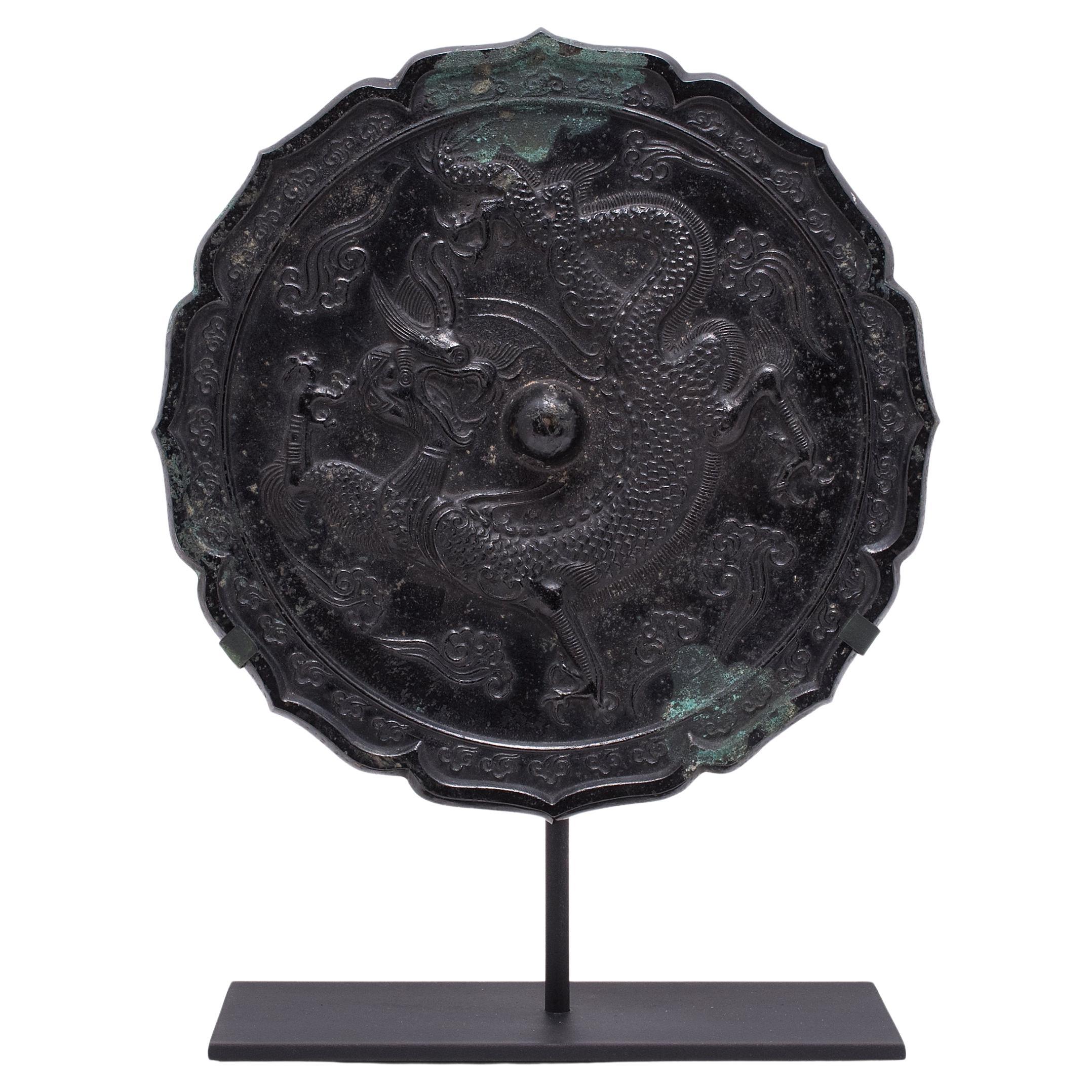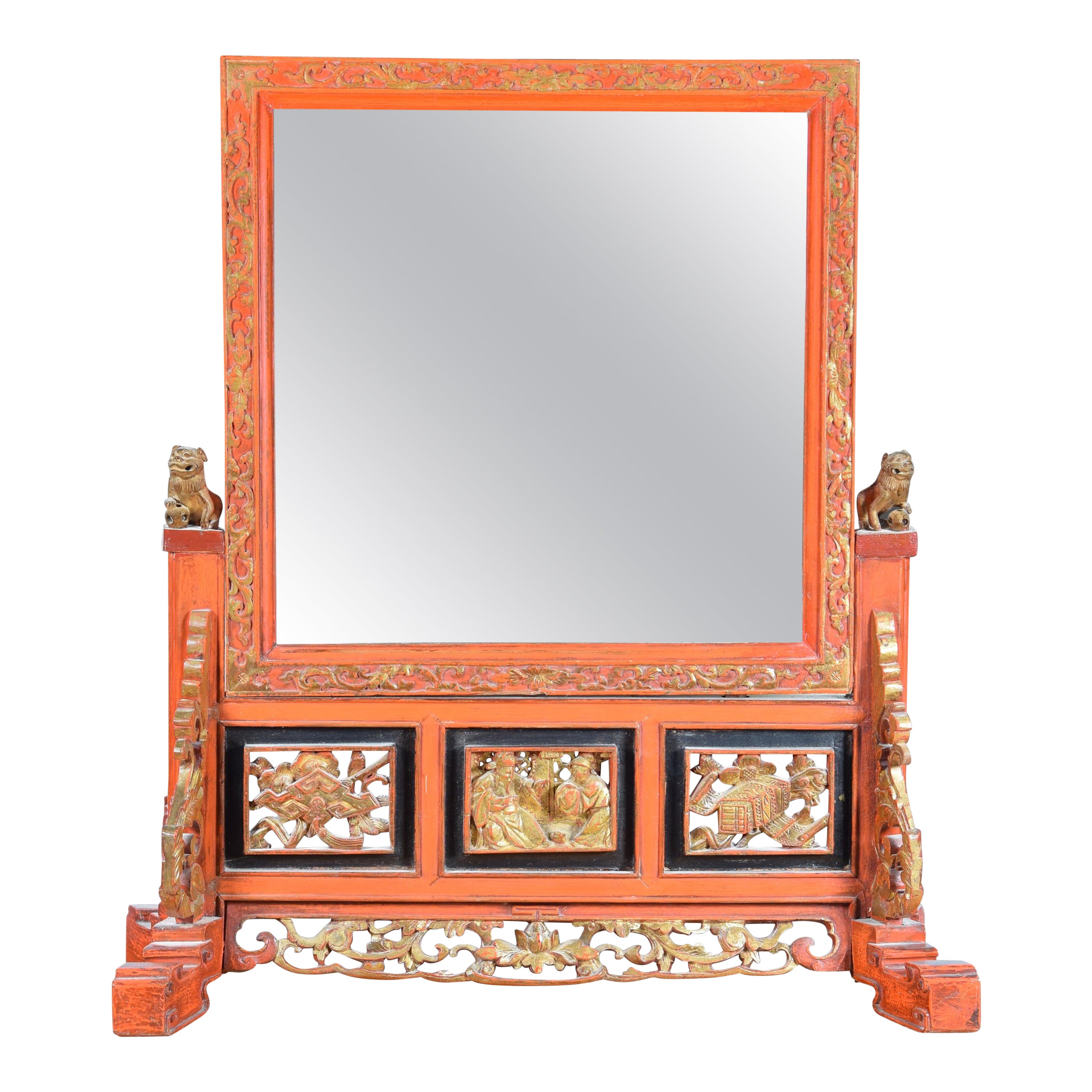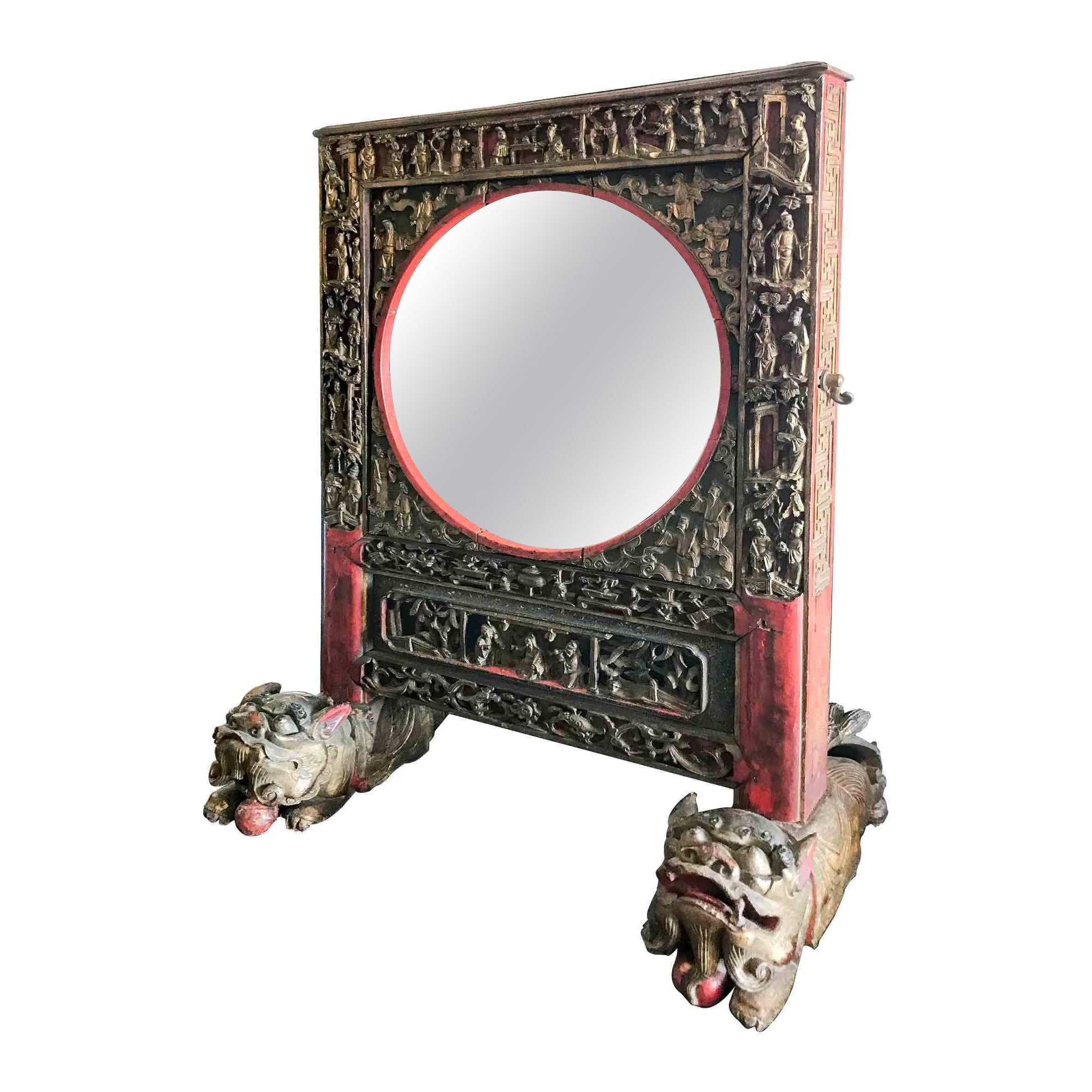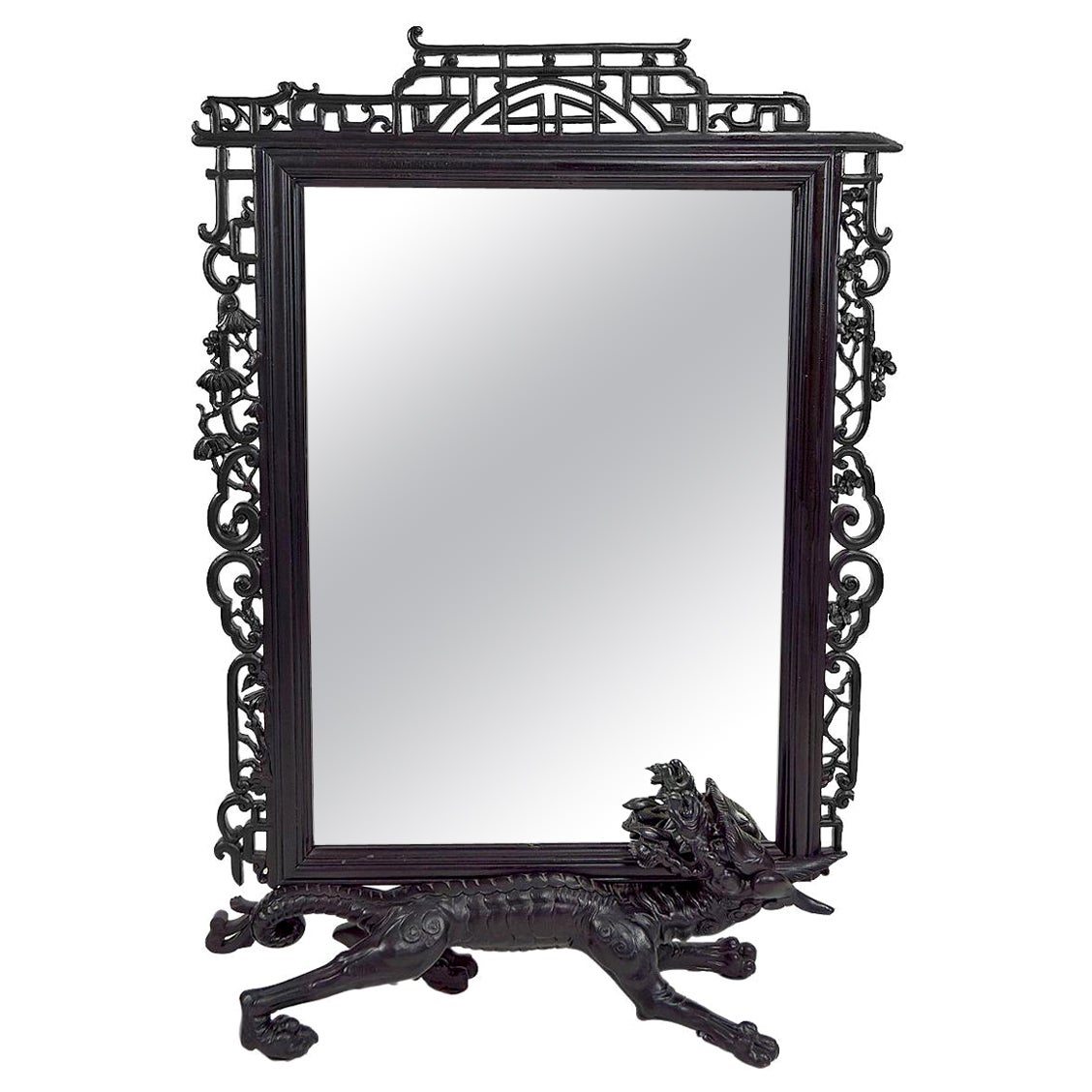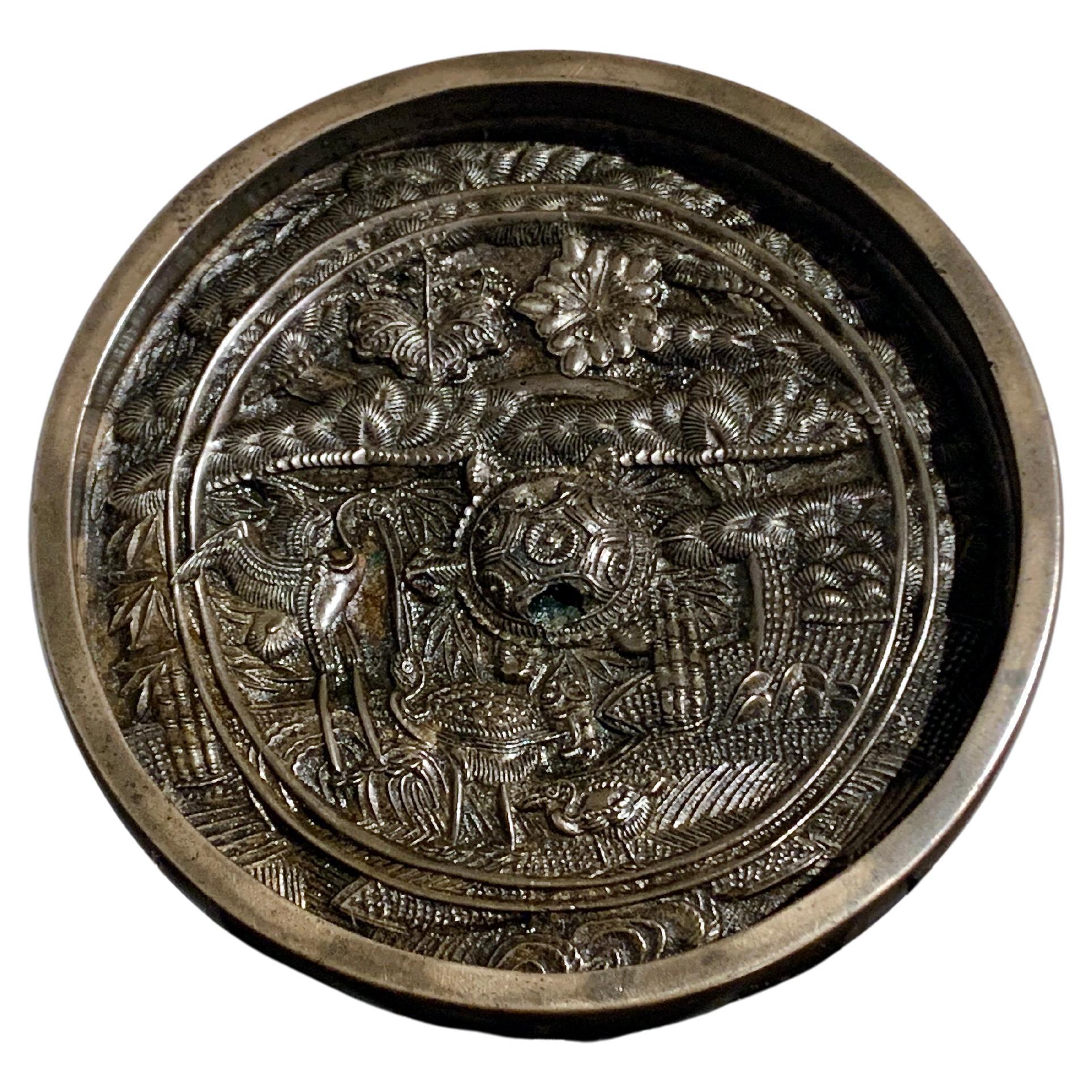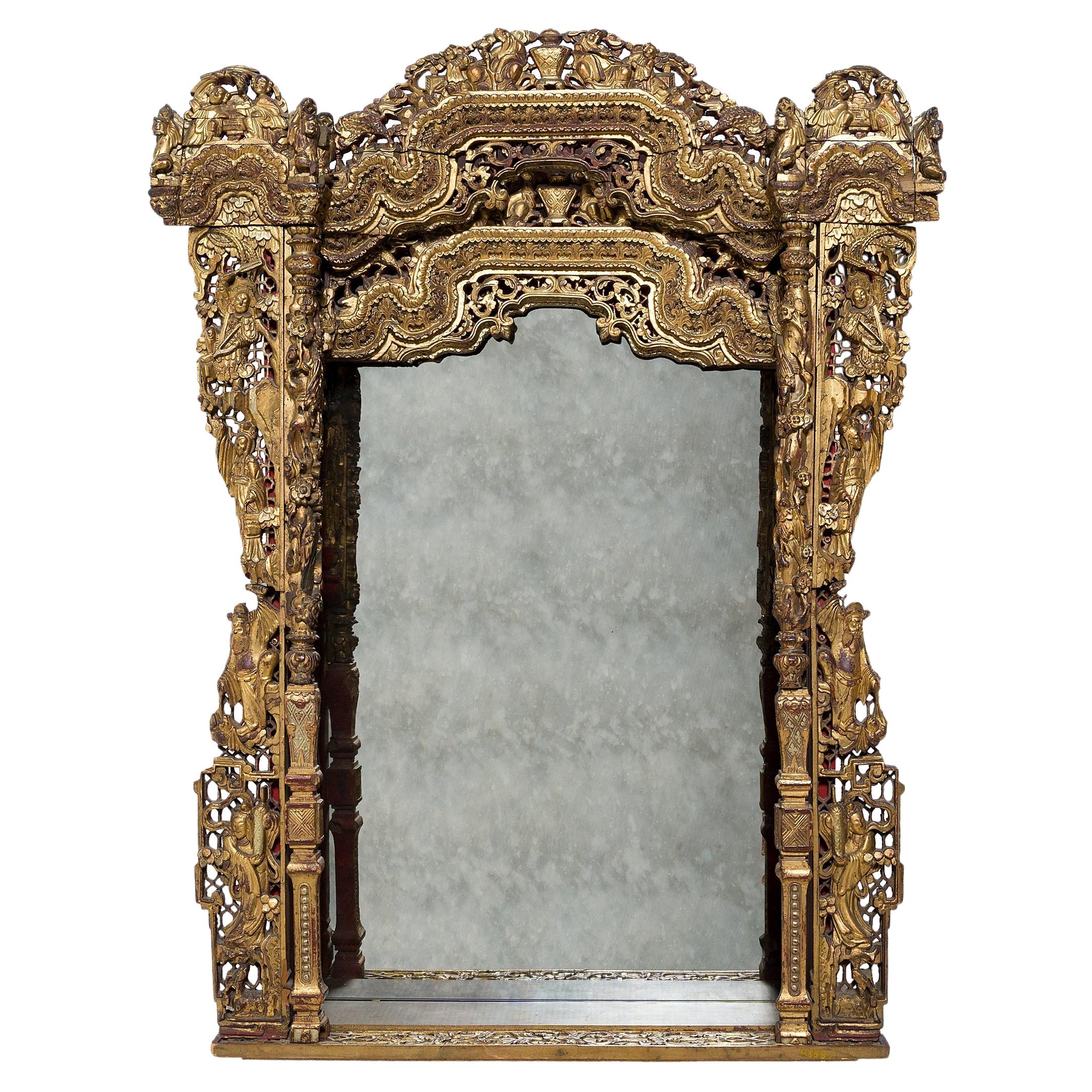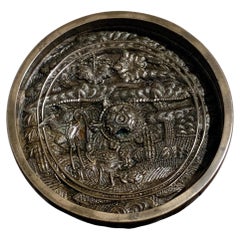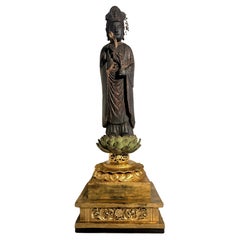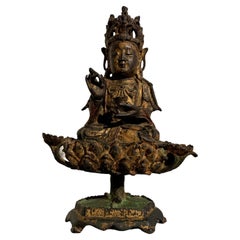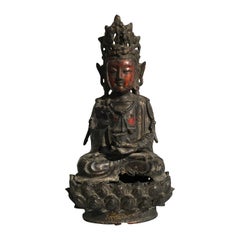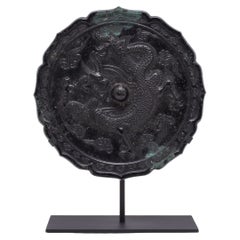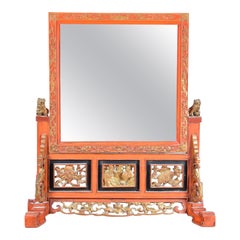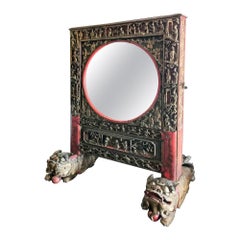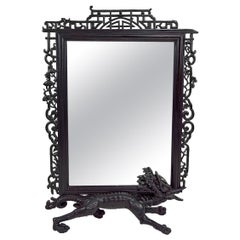Items Similar to Japanese Buddhist Mirror and Dragon Stand, Edo Period, early 19th c, Japan
Want more images or videos?
Request additional images or videos from the seller
1 of 19
Japanese Buddhist Mirror and Dragon Stand, Edo Period, early 19th c, Japan
$9,500
£7,213.58
€8,249.26
CA$13,272.88
A$14,762.34
CHF 7,708.43
MX$179,641.94
NOK 98,448.46
SEK 92,327.29
DKK 61,567.40
Shipping
Retrieving quote...The 1stDibs Promise:
Authenticity Guarantee,
Money-Back Guarantee,
24-Hour Cancellation
About the Item
A powerful and rare Japanese Buddhist "sacred" mirror and stand, Edo Period, late 18th or early 19th century, Japan.
The bronze mirror is housed in a two part gilt wood and lacquer frame. The top half shaped like a flaming jewel, hoju. The bottom half carved with a design of lotus petals supported by dense clouds. The inset mirror is silvered and polished on one side. The other side cast with images of karabana (fantasy flowers) arranged in a shippo (seven treasures) pattern. The mirror is signed with a cast signature Tenkaiichi Fujiwara saku (Made by Fujiwara, First Under Heaven). The Fujiwara lineage is renowned for making high quality mirrors.
The long handle of the mirror extends below the frame to set into the stand. The stand features a commanding and powerful carved gilt wood dragon coiled around a dramatic green and black pigmented carved rock work base. The entirety is supported by a black and red lacquer low table-form stand.
The carved gilt wood dragon is wonderfully expressive and full of motion. Its head is especially well carved, with an open mouth revealing a red tongue, and pronounced whiskers and eyebrows shading bulging painted eyes. The serpentine body, with intricately carved scales, seems to writhe around the rocks it rests on.
This mirror and stand would have been part of the regalia for a Buddhist shrine or temple. It would have been housed in an inner "secret" room to be used in sacred rituals and mediation. The mirror is supposed to be able to reflect the true nature of reality.
With two different accession numbers in red and blue ink written on all parts.
- Dimensions:Height: 22 in (55.88 cm)Width: 12 in (30.48 cm)Depth: 9 in (22.86 cm)
- Style:Edo (Of the Period)
- Materials and Techniques:
- Place of Origin:
- Period:
- Date of Manufacture:Early 19th century
- Condition:Additions or alterations made to the original: The top of the mirror frame re-gilt, and possibly of a later date. Refinished. Wear consistent with age and use. Minor losses. Minor structural damages. Minor fading. One section of the base missing. Scattered losses to the carving, lacquer, and gilding. The mirror with some patination.
- Seller Location:Austin, TX
- Reference Number:1stDibs: LU894741153342
About the Seller
5.0
Platinum Seller
Premium sellers with a 4.7+ rating and 24-hour response times
Established in 2001
1stDibs seller since 2010
345 sales on 1stDibs
Typical response time: <1 hour
- ShippingRetrieving quote...Shipping from: Austin, TX
- Return Policy
Authenticity Guarantee
In the unlikely event there’s an issue with an item’s authenticity, contact us within 1 year for a full refund. DetailsMoney-Back Guarantee
If your item is not as described, is damaged in transit, or does not arrive, contact us within 7 days for a full refund. Details24-Hour Cancellation
You have a 24-hour grace period in which to reconsider your purchase, with no questions asked.Vetted Professional Sellers
Our world-class sellers must adhere to strict standards for service and quality, maintaining the integrity of our listings.Price-Match Guarantee
If you find that a seller listed the same item for a lower price elsewhere, we’ll match it.Trusted Global Delivery
Our best-in-class carrier network provides specialized shipping options worldwide, including custom delivery.More From This Seller
View AllJapanese Cast Bronze "Longevity" Mirror, Edo Period, 18th Century, Japan
Located in Austin, TX
A heavy and finely cast Japanese bronze mirror with longevity symbols, Edo Period, 18th century, Japan.
The small, round mirror with high walls...
Category
Antique Late 18th Century Japanese Edo Metalwork
Materials
Bronze
Japanese Lacquered Wood Sho Kannon, Momoyama/Edo Period, 17th Century, Japan
Located in Austin, TX
A tall and impressive Japanese carved and black lacquered figure of Sho Kannon Bosatsu, Momoyama or Edo Period, mid 17th century, on a later mid 19th century carved, painted, and gilt wood lotus...
Category
Antique Mid-17th Century Japanese Edo Sculptures and Carvings
Materials
Metal
Chinese Ming Dynasty Bronze Nanhai Guanyin, 16th/17th Century, China
Located in Austin, TX
A decidingly charming Chinese polychromed and gilt cast bronze figure of Nanhai Guanyin, Guanyin of the South Sea, Ming Dynasty, 16th/17th century, China.
Guanyin, the bodhisattva of compassion, is portrayed here as a beatific figure seated upon a raised lotus pedestal over waves. Guanyin is dressed in heavy robes, and wears an elaborate headdress. The small figure of Amitabha Buddha in the headdress positively identifies this figure as Guanyin.
Guanyin rests one hand in his lap, holding a cup of pure water said to be able to alleviate all suffering. His other hand is raised, holding a willow branch which is used to sprinkle the healing waters.
The two lotus blossoms to either side of Guanyin would originally have supported figures of the acolytes...
Category
Antique Early 1600s Chinese Ming Sculptures and Carvings
Materials
Bronze
Chinese Ming Dynasty Lacquered and Gilt Bronze Bodhisattva, 17th Century
Located in Austin, TX
Chinese late Ming dynasty bronze figure of the Bodhisattva Avalokiteshvara, also known as Guanyin (Quan Yin, Kwan Yin, Kuan Yin), 17th century, China
The figure well cast in two ...
Category
Antique Mid-17th Century Chinese Ming Sculptures and Carvings
Materials
Bronze
Japanese Giltwood Medicine Buddha, Yakushi Nyorai, Muromachi Period 16th Century
Located in Austin, TX
A striking Japanese late Muromachi Period (1333-1573) lacquered and giltwood figure of Yakushi Nyorai, the Medicine Buddha, seated upon an elaborate car...
Category
Antique 16th Century Japanese Edo Sculptures and Carvings
Materials
Rock Crystal
Chinese Carved and Lacquered Figure of Zhenwu, Qing Dynasty, 19th century, China
Located in Austin, TX
A powerful Chinese figure of the Taoist diety Zhenwu (Xuanwu), carved and lacquered wood with applied lacquer details, Qing Dynasty, 19th century or earlier, China.
Zhenwu, also kno...
Category
Antique 19th Century Chinese Qing Sculptures and Carvings
Materials
Wood, Hardwood
You May Also Like
Chinese Bronze Mirror with Cast Relief Dragon, Late 19th Century
Located in Chicago, IL
This antique Chinese mirror is cast of bronze in the tang-dynasty style, with a lobed rim of eight flower petals, each filled with small cloud ...
Category
Antique Late 19th Century Chinese Qing Metalwork
Materials
Bronze
Oriental table mirror. Carved wood. China, 19th century.
Located in Madrid, ES
Oriental table mirror. Carved wood. China, 19th century.
Oriental style table mirror made of wood, and with decorations highlighted in gold. Both the style of the piece and these de...
Category
Antique 19th Century Asian Other Furniture
Materials
Other
Ancient Glorious Standing Mirror, China Late 19th Century
Located in Roma, IT
Glorious standing mirror is an original decorative object realized at the end of the 19th century by Chinese Manufacture.
Carved wood, polychrome painted and golden bronze, resting on two sculpturally guarded pho dogs...
Category
Antique Late 19th Century Chinese Table Mirrors
Materials
Brass
$3,187 Sale Price
30% Off
Japanese Style Viardot Mirror with Dragon, circa 1880
By Gabriel Viardot
Located in VÉZELAY, FR
Superb Japanese-style mantel / fireplace mirror in lacquered wood, carved with an imposing dragon and decorative motifs.
Japonism, France, circa 1880.
Attributed to Gabriel Viard...
Category
Antique 1880s French Japonisme Mantel Mirrors and Fireplace Mirrors
Materials
Fabric, Mirror, Wood, Lacquer
$7,668 Sale Price
20% Off
Chinese Gilt Shrine Wall Mirror, c. 1850
Located in Chicago, IL
A dazzling display of intricate carvings and gilt lacquer, this fabulous wall mirror was originally an ornate shrine surround used to enclose a religious figure or shrine display. The elaborate frame is comprised of highly decorated wood panels...
Category
Antique 19th Century Chinese Qing Wall Mirrors
Materials
Mirror, Wood
JAPAN 1810 Edo Period Large Butsudan Home Altar With Amida Nyorai In Wood
Located in Miami, FL
Large butsudan home altar with Amida Nyorai figure Edo Period (1600-1868)
This is a beautiful Japanese wooden statue of standing Amida Nyorai Buddha, from the Edo period (1600-1868)...
Category
Antique 1810s Japanese Edo Sculptures and Carvings
Materials
Gold, Brass
More Ways To Browse
Japanese Ceramics Edo Period Or Earlier
Japanese House
Antique Carving Set
Japanese Dragon
Antique Japanese Dragon
Antique Bronze Dragon
19th Century Ink Wells
Japanese Joinery
Cloud Mirror
Antique Silver Carving Set
Japanese Hand Mirror
Antique Japanese Mirrors
Antique Ink Well Set
Asian Dragon Sculpture
Japanese Temple Sculpture
Black Painted Carved Mirrors
Edo Period Bronze
Black Japanese Low Table
